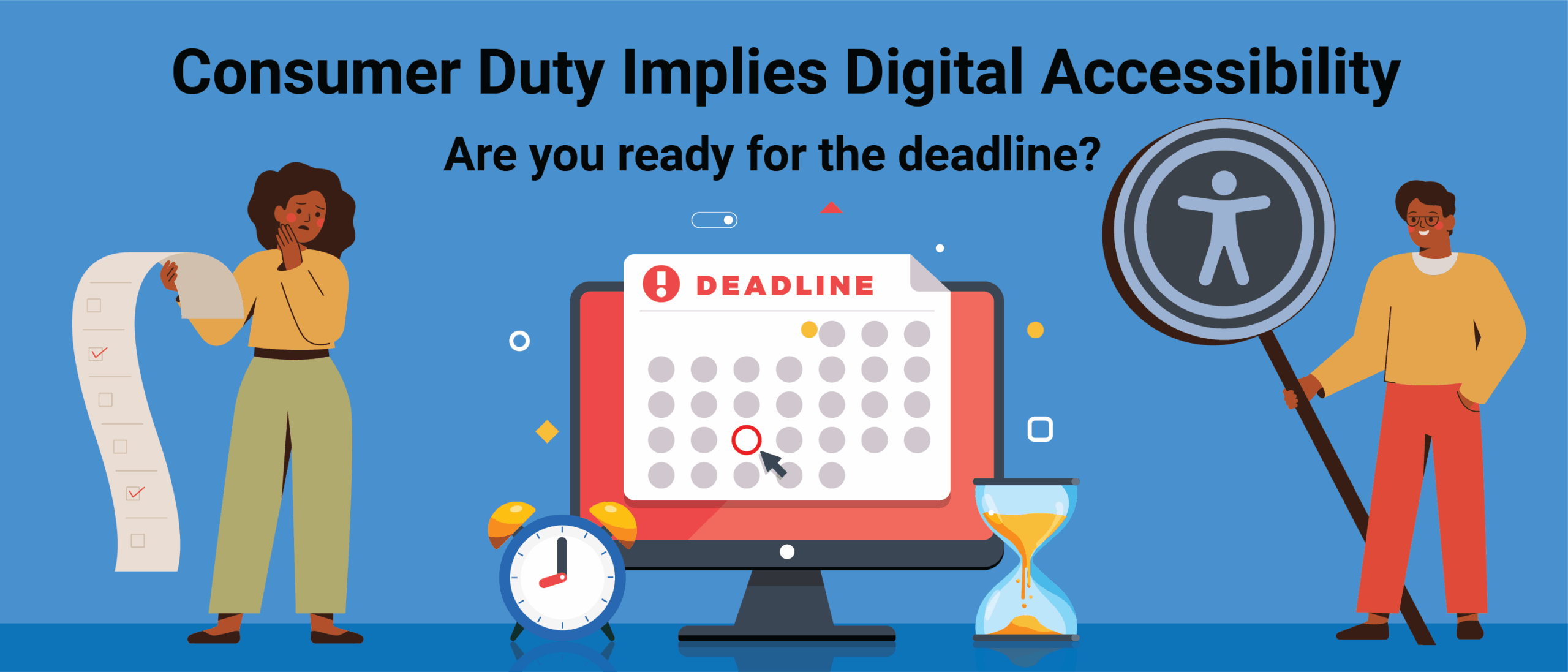On July 31, 2023, the Financial Conduct Authority’s (FCA) new Consumer Duty policy comes into force in the United Kingdom (UK). This sets higher and clearer standards of consumer protection across financial services and requires firms to put their customers’ needs first. It applies to all firms in the distribution chain for products and services sold to retail customers. These firms will need to apply the FCA’s Consumer Duty policy (PS22/9) to all new products and services starting on July 31, 2023. The FCA has given firms until July 31, 2024, to apply the Duty to existing products and services.
While Consumer Duty does not explicitly call out digital accessibility or Web Content Accessibility Guidelines (WCAG) levels, it does clearly call out that “consumers in vulnerable circumstances” are included in the policy. All customers are deserving of products and services they need – including customer support, processes, and communications –, when and, more importantly, how they need them.
One specific outcome called out in the Consumer Duty is ‘consumer understanding’. This can be directly correlated with cognitive and neurodiverse needs. It can also mean that any email or PDF file provided can be read and understood by any consumer. Providing inaccessible materials would fail this part of the policy. There is a direct correlation between WCAG success criteria and this defined outcome.
Another specific outcome is ‘consumer support.’ This means that a firm needs to ensure that their support channels work effectively for all users and do not present any barriers to customers. For example, does your Interactive Voice Response (IVR) route to a live agent automatically if no input response is received? This call routing method supports users with motor difficulties that cannot interact with the phone’s keypad.
The FCA’s outcomes define and establish rules and guidance which create a set of expectations for firms within the Duty. For example, poor product design may impact the user’s ability to determine if the offer is a good value to them, while failure to disclose rates clearly and understandably for a screen reader user could impact the user’s ability to fully understand the product they are signing up for. Additionally, firms are expected to provide evidence that they meet the outcomes defined within the policy, review and monitor conformance on an ongoing basis and, when issues are identified, they must be remedied or mitigated.
The intention is that firms not focus on processes alone, but to ensure that those processes have positive consumer impact. They will need to extend their focus beyond individual products or service lines to encompass their business model, value propositions and operating model. They will need to consider whether there are any inherent design flaws in the end-to-end customer relationship that could lead to poor customer outcomes.
Under the Consumer Duty, a firm’s board (or leadership when there isn’t a board) is responsible for assessing whether it is delivering good outcomes for its customers that are consistent with the Consumer Duty. This means that firms will need to determine what type, frequency, and level of reporting granularity their board will need to be able to provide this assurance. Consider whether your digital accessibility conformance results are being reported in a usable format for the board to be able to meet this requirement.
The responsibility for complying with all elements of the Consumer Duty should never fall to one individual. Instead, it should permeate through the entire firm, and through their design, distribution and delivery ecosystem. At Deque we refer to this as ‘shift-left.’ All team members are responsible for ensuring that the firm complies on an ongoing basis. Therefore, the way firms design, implement, assess, and monitor its solutions to support and demonstrate promised outcomes must be a core focus for everyone in the enterprise. Delivering good consumer outcomes runs through every action, is fully embedded into every department, and is supported by robust evidence. Consider whether your organization’s digital accessibility program has ‘shifted-left,’ embraces inclusive design, and directly contributes to the success of your digital user journeys – and whether it produces robust evidence at the right frequency to meet the Duty.
Consumer Duty is in addition to the Financial Conduct Authority statement that firms have a legal duty under the Equality Act 2010 to anticipate the needs of disabled customers and provide reasonable adjustments to enable them to use the service. This can include providing information in an accessible format. For example, it may be reasonable to provide information in braille, audio or another format rather than by letter for a customer with a visual impairment.
Through conformance reporting, strategic consulting, assessments, testing tools and processes, and remediation assistance, Deque can help firms ensure that they are meeting the Consumer Duty and/or meeting the Equality Act 2010. Contact us to find out more.


